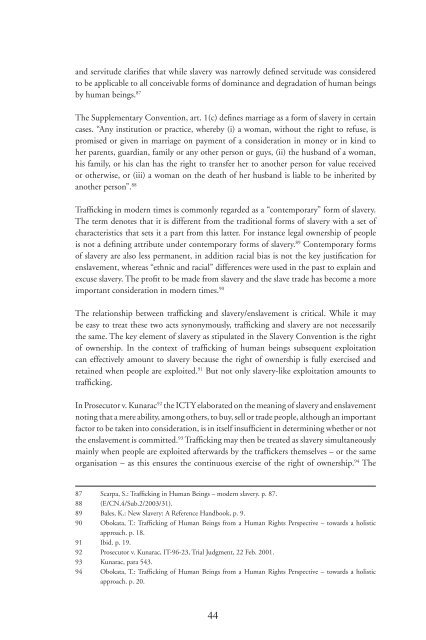Trafficking in human beings: human rights and ... - unesdoc - Unesco
Trafficking in human beings: human rights and ... - unesdoc - Unesco
Trafficking in human beings: human rights and ... - unesdoc - Unesco
Create successful ePaper yourself
Turn your PDF publications into a flip-book with our unique Google optimized e-Paper software.
<strong>and</strong> servitude clarifi es that while slavery was narrowly defi ned servitude was considered<br />
to be applicable to all conceivable forms of dom<strong>in</strong>ance <strong>and</strong> degradation of <strong>human</strong> be<strong>in</strong>gs<br />
by <strong>human</strong> be<strong>in</strong>gs. 87<br />
The Supplementary Convention, art. 1(c) defi nes marriage as a form of slavery <strong>in</strong> certa<strong>in</strong><br />
cases. “Any <strong>in</strong>stitution or practice, whereby (i) a woman, without the right to refuse, is<br />
promised or given <strong>in</strong> marriage on payment of a consideration <strong>in</strong> money or <strong>in</strong> k<strong>in</strong>d to<br />
her parents, guardian, family or any other person or guys, (ii) the husb<strong>and</strong> of a woman,<br />
his family, or his clan has the right to transfer her to another person for value received<br />
or otherwise, or (iii) a woman on the death of her husb<strong>and</strong> is liable to be <strong>in</strong>herited by<br />
another person”. 88<br />
Traffi ck<strong>in</strong>g <strong>in</strong> modern times is commonly regarded as a “contemporary” form of slavery.<br />
The term denotes that it is different from the traditional forms of slavery with a set of<br />
characteristics that sets it a part from this latter. For <strong>in</strong>stance legal ownership of people<br />
is not a defi n<strong>in</strong>g attribute under contemporary forms of slavery. 89 Contemporary forms<br />
of slavery are also less permanent, <strong>in</strong> addition racial bias is not the key justifi cation for<br />
enslavement, whereas “ethnic <strong>and</strong> racial” differences were used <strong>in</strong> the past to expla<strong>in</strong> <strong>and</strong><br />
excuse slavery. The profi t to be made from slavery <strong>and</strong> the slave trade has become a more<br />
important consideration <strong>in</strong> modern times. 90<br />
The relationship between traffi ck<strong>in</strong>g <strong>and</strong> slavery/enslavement is critical. While it may<br />
be easy to treat these two acts synonymously, traffi ck<strong>in</strong>g <strong>and</strong> slavery are not necessarily<br />
the same. The key element of slavery as stipulated <strong>in</strong> the Slavery Convention is the right<br />
of ownership. In the context of traffi ck<strong>in</strong>g of <strong>human</strong> be<strong>in</strong>gs subsequent exploitation<br />
can effectively amount to slavery because the right of ownership is fully exercised <strong>and</strong><br />
reta<strong>in</strong>ed when people are exploited. 91 But not only slavery-like exploitation amounts to<br />
traffi ck<strong>in</strong>g.<br />
In Prosecutor v. Kunarac 92 the ICTY elaborated on the mean<strong>in</strong>g of slavery <strong>and</strong> enslavement<br />
not<strong>in</strong>g that a mere ability, among others, to buy, sell or trade people, although an important<br />
factor to be taken <strong>in</strong>to consideration, is <strong>in</strong> itself <strong>in</strong>suffi cient <strong>in</strong> determ<strong>in</strong><strong>in</strong>g whether or not<br />
the enslavement is committed. 93 Traffi ck<strong>in</strong>g may then be treated as slavery simultaneously<br />
ma<strong>in</strong>ly when people are exploited afterwards by the traffi ckers themselves – or the same<br />
organisation – as this ensures the cont<strong>in</strong>uous exercise of the right of ownership. 94 The<br />
87 Scarpa, S.: Traffi ck<strong>in</strong>g <strong>in</strong> Human Be<strong>in</strong>gs – modern slavery. p. 87.<br />
88 (E/CN.4/Sub.2/2003/31).<br />
89 Bales, K.: New Slavery: A Reference H<strong>and</strong>book, p. 9.<br />
90 Obokata, T.: Traffi ck<strong>in</strong>g of Human Be<strong>in</strong>gs from a Human Rights Perspective – towards a holistic<br />
approach. p. 18.<br />
91 Ibid. p. 19.<br />
92 Prosecutor v. Kunarac, IT-96-23, Trial Judgment, 22 Feb. 2001.<br />
93 Kunarac, para 543.<br />
94 Obokata, T.: Traffi ck<strong>in</strong>g of Human Be<strong>in</strong>gs from a Human Rights Perspective – towards a holistic<br />
approach. p. 20.<br />
44

















